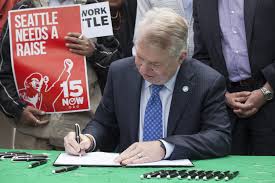Seattle, Washington $15 Minimum Wage
On Tuesday June 3, 2014 the mayor of Seattle, Ed Murray, signed a law that will increase the city’s minimum wage to $15 per hour by 2017, making it the highest rate nationwide. The increase from the current Washington state minimum wage of $9.32 per hour will be phased in over several years.
Beginning April 1, 2015, large employers in Seattle must pay employees at least $11.00 per hour. In 2016, the city’s minimum wage will increase to $13.00 and beginning in 2017, it will become $15.00 per hour. However, it provides a different schedule of phased minimum wage increases for small employers.
The Seattle minimum wage law also includes annual increases in the minimum wage beginning January 1, 2018, based on the consumer price index. The Seattle city council unanimously passed Bill # 118098 with a 9 to 0 vote on Monday June 2, 2014, adding the new minimum wage provision (Chapter 14.19) to the Seattle Municipal Code. The law was based on a recommendation from the mayor’s Income Inequality Advisory Committee.
Even for the largest employers, there are a number of exceptions to the Seattle $15 minimum wage law, including savings for employers who provide health benefits. Seattle employers can save up to $1.50 per hour beginning in 2016 by paying part of the individual health insurance costs for employees under the law. Large employers who pay part of a worker’s medical benefits plan can phase the higher minimum wage in more slowly. Those employers can pay workers $12.50 per hour (instead of $13.00) in 2016 and $13.50 per hour (instead of $15.00) in 2017. However, beginning in 2018 that reduction is eliminated and the employer must pay the full minimum wage of more than $15.00 per hour.
The ordinance defines a large (or “Schedule 1”) employer as any business with 500 or more employees nationwide. In a controversial move, the law also counts any franchisee as a large employer, if all the franchises combined have 500 or more employees nationwide. This may create a competitive disadvantage for a franchisee versus a similar business with no franchise brand name. For example, the owner of a local Subway sandwich shop employing 8 workers, has to pay higher wages than the privately owned, non-franchise mom-and-pop sandwich shop with 8 employees across the street.
Commissions, bonuses and fees for piece-rate work can be counted as a portion of the Seattle minimum wage, but there is no provision for large employers to take a tip credit or pay a lower minimum wage to tipped employees.
The Seattle minimum wage law covers all employee while they are performing work within the city limits. However, it does not cover employees who merely travel through Seattle en route to work outside the city limits – even if the traveling employee pauses for meals, refueling or rest breaks, the law does not apply.
An employee who works in Seattle on an occasional basis is covered for the work hours within the city limits, only if he or she performs at least 2 hours of work in Seattle during a two-week period. An employee from Preston, WA who attended a meeting in Seattle for a single hour during a two-week period, would not be entitled to the Seattle minimum wage for that time, and could be paid at his or her usual hourly rate. However, if the meeting in Seattle took 3 hours, the employee would be entitled to $15 per hour, for 3 hours – not for the entire work week.
Bookmark the permalink

 Cart (0)
Cart (0)




